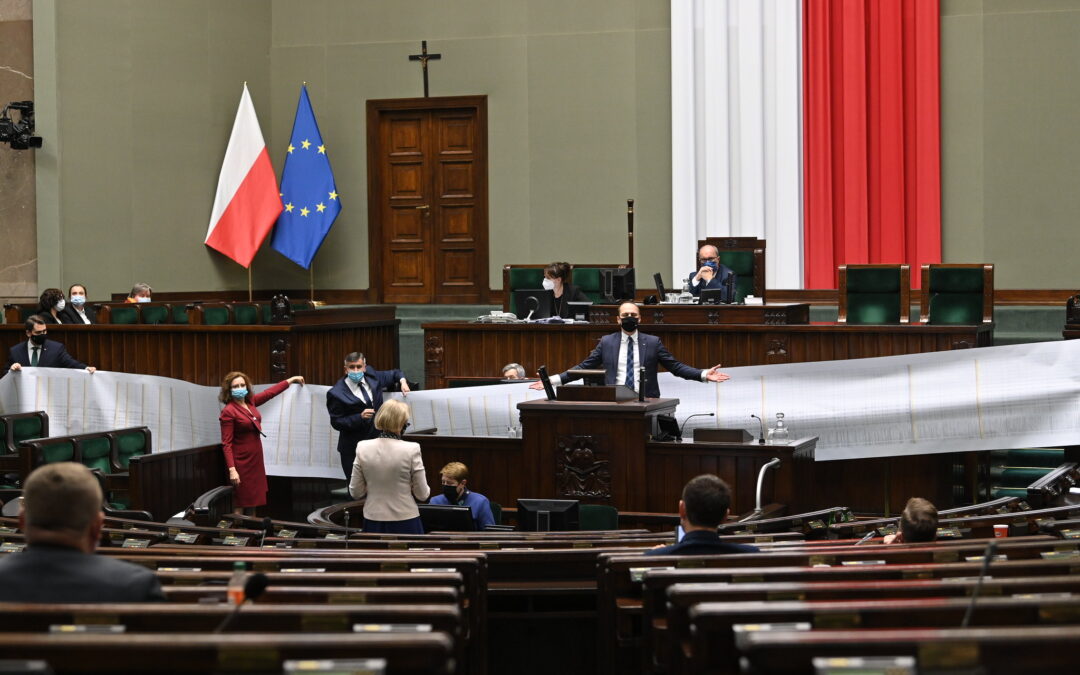Donald Tusk, the leader of Poland’s largest opposition party, has called for Christian crosses to be removed from public places such as schools, where they are commonly displayed, and parliament, where one has hung in the main chamber since the 1990s.
His remarks were immediately condemned by a minister from the national-conservative government, who accused Tusk of promoting “the dictatorship of leftism and atheism like in the West”.
During an online question-and-answer session yesterday, Tusk – who returned as leader of the centrist Civic Platform (PO) party last month – was asked whether he thinks crosses should hang in schools.
“I think not,” he replied. “Schools should teach us mutual respect, regardless of whether someone is a believer or not.”
“That is why generally public places, be it the Sejm or a school, should be free from religious symbolism,” he continued. “I would like churches, not public offices or schools, to be the place where those who believe can meet and pray.”
Tusk emphasised that in saying so he was not being anti-clerical, but rather that such a separation would be of benefit to the church and faithful. He also recently declared that, as a practising Catholic, he was angered by how the ruling Law and Justice (PiS) party was “destroying the church” by turning it into a “political tool”.
Tusk’s remarks about crosses on Thursday were met with a critical response from the education minister, Przemysław Czarnek, who is an outspoken figure from the ultraconservative wing of PiS.
“Fortunately, we have religious freedom in Poland and it is parents and management who decide whether there are religious symbols at school and what they are, in line with the jurisprudence of the European Court of Human Rights and Polish courts,” tweeted Czarnek.
“[We have] freedom, not the dictatorship of leftism and atheism like in the West,” he added. After becoming a minister last year, Czarnek pledged to fight the “totalitarian dictatorship of left-liberal views” that “dominates education”.
In June, he argued that it was vital for Polish children to receive a Christian education so that they can “save Latin civilisation in Europe and the world”. He is currently preparing to make it compulsory for all pupils to study either Catholic catechism or ethics.
Polish government picks Catholic universities to train teachers for compulsory school ethics classes
Poland’s constitution stipulates that “public authorities…shall be impartial in matters of personal conviction, whether religious or philosophical”, while there should also be “autonomy” between church and state.
Many public institutions – where officially over 90% of the population are Roman Catholic – display Christian crosses. This includes the Sejm, the lower house of parliament, where a cross has hung since 1997 when it was installed without permission during the night by two MPs.
That cross has long been a source of dispute. After it was hung, it immediately drew criticism from left-wing MPs. In 2011, the liberal, anti-clerical Palikot’s Movement (Ruch Palikota) sought to have it removed, a call that was repeated by another party, The Left (Lewica), in 2019
Two years ago, PO – which spans both socially liberal and conservative wings – avoiding entering the debate, with one of its senior MPs saying he had “got used to” the cross and “there are more important matters” to deal with. Tusk’s latest remarks may signal a change in approach.
PO’s centrist rival, Poland 2050 (Polska 2050), whose leader Szymon Hołownia is also a practising Catholic, recently outlined its own plans for stronger separation between church and state.
In 2011, a poll by CBOS found that 60% of Poles thought the cross should hang in parliament while only 17% thought it should not. It also showed that 88% of Poles were not bothered by crosses in public offices and schools, while only 10% said that they were.
In a more recent poll – by IBSP for Wirtualna Polska in January last year – 65% of respondents said they thought that the cross should hang in parliament while 24% said it should not.
Main image credit: Kancelaria Sejmu/Łukasz Błasikiewicz (under CC BY 2.0)

Daniel Tilles is editor-in-chief of Notes from Poland. He has written on Polish affairs for a wide range of publications, including Foreign Policy, POLITICO Europe, EUobserver and Dziennik Gazeta Prawna.




















